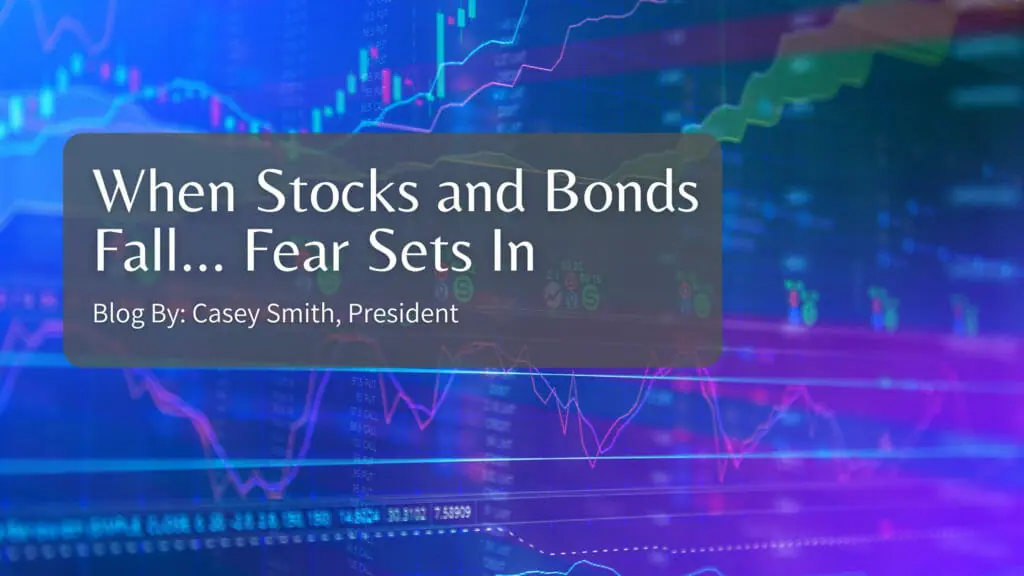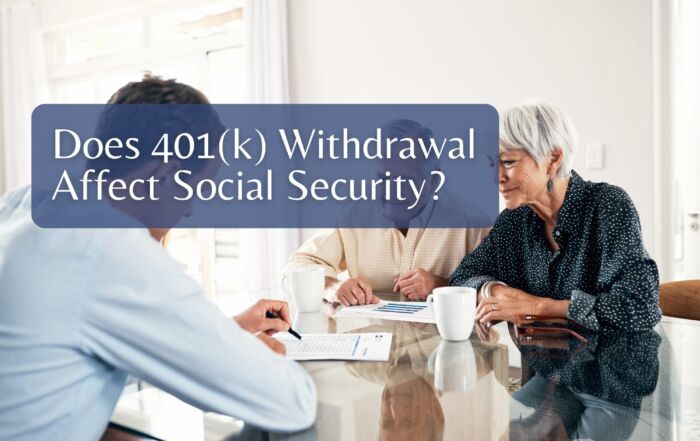When Stocks and Bonds Fall… Fear Sets In

When clients think about investing risks, they mostly think about stocks. Each weekday financial news reports about the Dow, NASDAQ, and the S&P 500 inundate audiences with all kinds of dire predictions about the market. Therefore, when clients think about investing safely, they think about bonds. Many can’t explain why bonds should be safer, but just think they are. Many times, when stocks go down, bonds will trade up, as they did during the Covid sell off in 2020. Investors are often surprised to see that their portfolios are not as bad as what they see on TV. There are times, however, when this is not the case. When both stocks and bonds fall, investors become uncomfortable watching their portfolios decline much more than expected. This pushes their risk tolerance threshold to the brink of portfolio liquidation.
The Market in 2022
As we cross over the halfway point of 2022, the market, economic, and geopolitical conditions around us appear very messy. Inflation is hitting 40-year highs, the Federal Reserve is sharply reversing monetary policy, the pandemic hasn’t entirely gone away, and supply chain woes have been exacerbated by COVID-19 lockdowns in China and Russia’s invasion of Ukraine, with the latter putting the Western bloc the closest to a war footing in decades.
Not surprisingly, this perfect storm of negative market drivers has pushed stock and bond prices down together, impeding the normal diversification of risks in a balanced stock-to-bond portfolio.
A recent whitepaper by Vanguard noted that since 1976, stocks and bonds have declined together 15% of the time. That’s a month of joint declines every seven years or so, on average. This time, it will take longer for bonds to recover. Stocks could be making the rebound first, but bonds still have an important role in portfolio risk management.
Purpose of Bonds in a Portfolio
The purpose of bonds in a portfolio is diversification to reduce a portfolio’s risk/volatility vs the stock market. For example, in a 60% stock, 40% bond (60/40) portfolio from January 1, 1926, through December 31, 2021, the average return was 8.8% (Vanguard research). Going forward, the Vanguard Capital Markets Model® (VCMM) projects the long-term average return to be around 7% for the 60/40 portfolio. Market volatility means diversified portfolio returns will always remain uneven, comprising periods of higher or lower—and, yes, even negative—returns.
When Bonds Fall
So why not just sell-off stocks or even bonds and buy back when things are better? Market timing is extremely difficult even for professional investors, and it is doomed to fail as a portfolio strategy. Markets are incredibly efficient at quickly pricing unexpected news and shocks. Such as the invasion of Ukraine or the accelerated and synchronized central bank response to global inflation. Chasing performance and reacting to headlines are doomed to fail as timing strategies every time since they usually lead to buying high and selling low. Far from abandoning balanced portfolios, investors should keep their investment programs on track during times of volatility. For those still working, you are getting more shares per dollar invested the longer you stay invested. For those retired, you will still be focusing long term by having enough cash reserves to weather the financial volatility.
How to Invest in 2022
There is no magic formula for investing during a year like 2022. Successful investing takes balance and discipline. Those liquidating portfolios in 2022 are folding to fear and destroying future wealth, while those riding out the volatility by staying invested (scary though it can be) will be the ultimate winners.
Have more questions? Contact Us
Casey Smith
President
Share This Story, Choose Your Platform!
Wiser Wealth Management, Inc (“Wiser Wealth”) is a registered investment adviser with the U.S. Securities and Exchange Commission (SEC). As a registered investment adviser, Wiser Wealth and its employees are subject to various rules, filings, and requirements. You can visit the SEC’s website here to obtain further information on our firm or investment adviser’s registration.
Wiser Wealth’s website provides general information regarding our business along with access to additional investment related information, various financial calculators, and external / third party links. Material presented on this website is believed to be from reliable sources and is meant for informational purposes only. Wiser Wealth does not endorse or accept responsibility for the content of any third-party website and is not affiliated with any third-party website or social media page. Wiser Wealth does not expressly or implicitly adopt or endorse any of the expressions, opinions or content posted by third party websites or on social media pages. While Wiser Wealth uses reasonable efforts to obtain information from sources it believes to be reliable, we make no representation that the information or opinions contained in our publications are accurate, reliable, or complete.
To the extent that you utilize any financial calculators or links in our website, you acknowledge and understand that the information provided to you should not be construed as personal investment advice from Wiser Wealth or any of its investment professionals. Advice provided by Wiser Wealth is given only within the context of our contractual agreement with the client. Wiser Wealth does not offer legal, accounting or tax advice. Consult your own attorney, accountant, and other professionals for these services.





